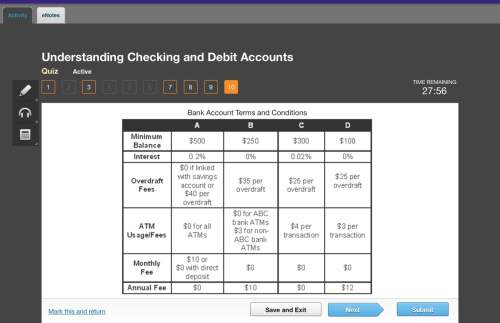
Business, 18.04.2020 03:49 harrisakeeyah
A company produces a product that normally sells for $24 each. The total manufacturing cost is $17, of which $11 consists of variable costs and $6 consists of fixed costs. The company is considering whether it should accept a one-time special order for 2,000 units at a special price of $15 each. Assuming that sufficient excess capacity exists and that no other relevant considerations exist, a differential analysis would suggest that the company should:.

Answers: 2


Another question on Business

Business, 21.06.2019 23:20
Which feature transfers a slide show into a word-processing document?
Answers: 2

Business, 22.06.2019 01:00
When color is used on a topographical drawing, black is used to represent what?
Answers: 1

Business, 22.06.2019 01:30
The strength of the economy depends on the balance pf production and consumption of goods and consumption of goods and services
Answers: 1

Business, 23.06.2019 02:40
Northern lights electronics just completed plans to distribute its new tablet. the product has several unique features that differentiate it from competitor products. the marketing team plans to begin a roll-out with to only one traditional retailer for the first two months. this strategy will give consumers the perception of the product’s stand-out personality and increase demand. marketing will proceed with for the next four months, where it plans to distribute to three other retailers, as well. for the last six months of the year, it will initiate distribution agreements with discount retailers and online retailers, and any other electronics store that wants to carry it. the marketing team is confident that the tablet will cycle through the first three stages of its product life cycle quickly. as the tablet reaches maturity during the second half of its first year in the market, it is good strategy to proceed with as described above. intensive distribution; selective distribution; exclusive distribution exclusive distribution; selective distribution; intensive distribution tertiary level distribution; secondary level distribution; mono-level distribution mono-level distribution; secondary level distribution; tertiary level distribution
Answers: 3
You know the right answer?
A company produces a product that normally sells for $24 each. The total manufacturing cost is $17,...
Questions

Biology, 23.08.2019 00:30

Mathematics, 23.08.2019 00:30

Spanish, 23.08.2019 00:30


Chemistry, 23.08.2019 00:30


Social Studies, 23.08.2019 00:30

English, 23.08.2019 00:30

Mathematics, 23.08.2019 00:30

Biology, 23.08.2019 00:30


Mathematics, 23.08.2019 00:30




Computers and Technology, 23.08.2019 00:30

Arts, 23.08.2019 00:30

Biology, 23.08.2019 00:30

Mathematics, 23.08.2019 00:30




